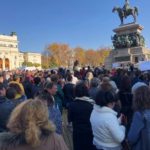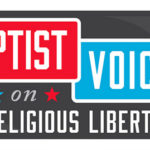Posted 7/14/03
Texas Baptists Committed convocation
focuses on religious liberty
By Mark Wingfield
Managing Editor
SAN ANTONIO–“Where have all the Baptists gone?” the head of a religious-liberty watchdog group asked members of Texas Baptists Committed July 11.
Brent Walker, executive director of the Baptist Joint Committee in Washington, D.C., opened the annual TBC convocation with a message that set the stage for two days of talks on religious freedom.
He was joined on the program by a Republican who is working to reclaim her party from the Religious Right, a Democratic Texas Congressman, three pastors, a theologian and a Baptist lobbyist.
The recurring theme of the messages was that Baptists helped secure religious liberty in the United States but Baptists today are leading a campaign to dilute that liberty.
“Religious freedom truly is under attack,” explained David Currie, TBC executive director. He cited “an assault led by Baptists on the First Amendment” and called Texas Baptists to “preserve what our forebears worked so hard to achieve.”
Walker traced the lineage of Baptists who have sacrificed for religious liberty through the ages, including Thomas Helwys, Roger Williams, John Leland and George W. Truett.
“Baptists helped forge the American experiment in religious liberty,” he declared. But today, too many Baptists “believe faith can best be advanced with the help of Herod.”
Sign up for our weekly edition and get all our headlines in your inbox on Thursdays
Although enshrined in the U.S. Constitution, religious liberty first is a gift from God, Walker asserted. “Soul freedom is universal.”
He then rebuffed several common arguments used to weaken the claim of separation of church and state.
America is not a “Christian” nation, he said, and Christianity should not be “given a leg up” to advance its cause, Walker said. Nor should government promote religion at all, even if it doesn't prefer one religion over another, he said, citing three rejections of such a concept during the drafting of the Bill of Rights.
Further, it is not enough to advocate freedom of religion without freedom from religion, he added. “Without freedom from religion, we don't have freedom of religion.”
Baptists must recover their heritage as defenders of religious liberty for all people, Walker said.
This effort will be aided as Baptists remember what it is like to be a minority group and reread Scripture to see Jesus' example, he continued. “Jesus never took a coin from Caesar or a handout from Herod to advance his mission.”
That theme was echoed by Weldon Gaddy, a former Texas pastor who is executive director of the Interfaith Alliance in Washington, D.C.
He said people often ask him, “Why are you so adamant about religious liberty?”
The answer, he said, is “because I was raised a Baptist. I believed in the separation of church and state before I knew what it was. That was because I went to Training Union.”
Today, advocating religious liberty is part of his faith and part of his patriotism, he added.
Look to the past to see the dangers that lie ahead, he warned. “History documents a sad tendency. The majority always feels it has a right to impose its opinion on the minority.”
Yet Baptists historically have stood against such coercion, he said, citing the example of early American Baptists who were persecuted and jailed for preaching the gospel without a license.
“Religious freedom serves as the foundation for other freedoms,” he said. “Once religious freedom is gone, other freedoms are likely to fade as well.”
Like Walker, Gaddy lamented that the times are changing.
“We stand at a U-turn in our national commitment to religious liberty,” he warned. “We will have to fight hard” to keep it from eroding further.
Baptists must realize that their nation and their communities are more religiously diverse than ever before, Gaddy said, noting that the United States is “the most religiously pluralistic nation in the world.”
Growing up in West Texas, he recalled, he knew one Jew and no Catholics, Hindus or Buddhists.
“It's a different world,” he reported. “We are a religiously pluralistic nation like none other.”
But that means religious liberty is “more essential today than it has ever been,” he continued. “Religious liberty provides the various religions in our society a means of walking together.”
Religious liberty also serves as a protection against civil war, Gaddy added, urging the crowd to examine the number of nations in conflict today due to warring religious groups where religious liberty does not exist.
“Religious freedom is vital for the good of all people and for the glory of God who wants all people free,” he said.
Contrary to common perceptions, not all Republicans concur with the Religious Right and seek to break down the wall of separation between church and state, said Sondra Epstein, a Republican activist from Houston.
She described herself as a member of “several Republican mainstream organizations” who wants Texas Baptists to understand that the Religious Right seeks to “take over government” and radically alter the meaning of religious liberty in America.
“To my heartfelt sorrow, they are doing this through the Republican Party,” she said.
But not all Republicans share the ideals of the Religious Right, she added. “There is a rift in the Republican Party similar to the one Baptists have experienced.”
She lamented that too often today the Republican Party “wraps itself in God as if it has a monopoly on his thoughts.”
Epstein urged her fellow Republicans who cherish separation of church and state to vote in the primaries, which is “where moderate Republicans lose.”
She also urged them to communicate with legislators to counter the more extreme voices of the far right. “Republican legislators mostly hear from extremists,” she said.
Like the other speakers, Epstein urged Texas Baptists to advocate religious liberty for all people. “If all religions in America don't have a future, then no religions have a future.”
U.S. Rep. Chet Edwards, a Democrat from Waco, picked up the theme by declaring that “religious liberty in America as we know it is at great risk.”
“We must act now, and we must act boldly,” he urged. “The sacred wall of separation is being torn down in Washington brick by brick. We simply cannot let that attack succeed.”
The fight for church-state separation, he said, is the single most important issue of his congressional career, and it now intersects a wide range of legislation.
He cited two aspects of President Bush's faith-based initiatives as the greatest current threats to religious liberty. One is an effort to allow taxpayer funding of houses of worship, and the other is an attempt to allow religious discrimination in hiring for publicly funded jobs.
“These attacks did not begin during the Bush administration, but for the first time, the full effort of the administration is behind it,” he said.
Edwards referred several times to a “well-organized, well-financed” network of Religious Right activists. These ideologues, he said, want the American people to believe that separation of church and state is a “myth” and the concoction of religious liberals.
In reality, he explained, the concept of a wall of separation was articulated by Thomas Jefferson in a letter to a group of Baptists in Danbury, Conn. Baptists, he and other speakers noted, were at the forefront of advocating for the First Amendment to the U.S. Constitution.
Edwards explained how he has been targeted by the Christian Coalition and other Religious Right groups because he supports Baptists' historic understanding of religious liberty.
One Christian Coalition mailing to constituents in his district labeled him “anti-American” and “anti-Texan” for not supporting a school-prayer bill.
He asked: “Since when is it anti-American and anti-Texan” to believe government shouldn't force students to pray?
Likewise, he critiqued legislative attempts to mandate posting the Ten Commandments in schools and public buildings. He denounced the “ludicrous idea of having government … review religious documents and determine which ones can be placed on schoolhouse walls.”
It is ironic, Edwards said, that political conservatives who want to limit the role of government at the same time insist on giving government more power to dictate citizens' religious practices.
“The Bill of Rights was designed to protect all citizens,” he said. “To deny that right to any person is wrong.”
Edwards urged Baptists to once again become passionate about religious liberty. The most effective way to influence legislators, he said, is to organize groups of 50 to 100 concerned citizens and ask legislators to meet with them.
“If we're going to be in the big leagues on this fight,” he said, “we can't use Little League tactics.”
Other speakers at the July 11-12 convocation included Suzii Paynter, director of Christian citizenship with the Texas Christian Life Commission; Mark Newton, pastor of First Baptist Church of San Marcos; John Petty, pastor of Trinity Baptist Church of Kerrville; John Ogletree, pastor of Metropolitan Baptist Church of Houston; and Javier Elizondo, dean of academic affairs at Hispanic Baptist Theological School in San Antonio.














We seek to connect God’s story and God’s people around the world. To learn more about God’s story, click here.
Send comments and feedback to Eric Black, our editor. For comments to be published, please specify “letter to the editor.” Maximum length for publication is 300 words.